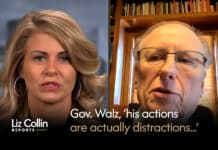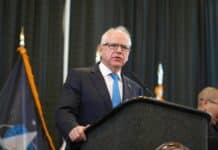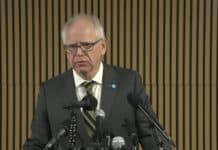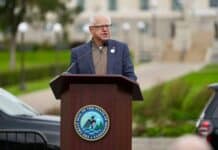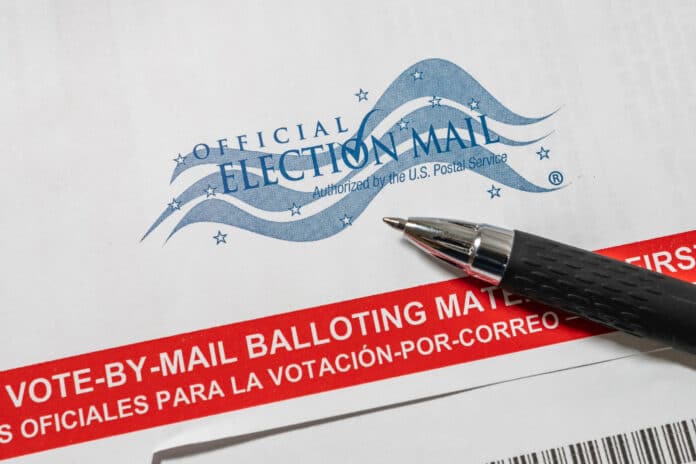
A pair of Republican state legislators have sought detailed answers in recent weeks from the Minnesota Department of Public Safety (DPS) regarding how the agency is vetting voter eligibility as part of a new automatic voter registration system that became operational this year.
On Thursday, they received some answers.
In 2023, Democrats passed a law which automatically registers Minnesotans to vote when they apply for a driver’s license or update their driver’s license. That same year, Democrats also passed a law which allows illegal immigrants to receive driver’s licenses.
As such, Rep. Paul Torkelson, R-Hanska, and Sen. Mark Koran, R-North Branch, sent five questions to DPS on Sept. 4 that ask about the agency’s efforts in keeping non-eligible individuals from becoming automatically registered to vote. The legislators expressed frustration earlier this week that they had not received answers.
“We were repeatedly told during (legislative) debates that there would be no problem with ineligible voters being inadvertently registered under the new law, yet here we are with no answers to any of our questions and early voting beginning in less than two weeks,” Koran and Torkelson said in a statement Monday.
“The integrity of our election system is of the utmost importance, and the lack of response from DPS on these important questions is disturbing, to say the least,” Koran and Torkelson continued. “Minnesotans deserve to know that only eligible voters are included on our voter rolls. We need answers from the Walz administration on this issue now.”
Among other questions, the Republicans asked how many ineligible voters had been identified by DPS. Additionally, the pair asked what changes, if any, have been made to ensure that information from non-citizens or ineligible voters is not being sent to the Minnesota Secretary of State for voter registration.
On Thursday Department of Public Safety Commissioner Bob Jacobson wrote the legislators, informing them that as of April, more than 65,000 Minnesotans “have been successfully registered to vote” through the new automatic voter registration system. Another 25,000 16- and 17-year-old Minnesotans have been pre-registered under the new system.
As of Monday, the department’s Driver and Vehicle Services division completed its manual review of 103,986 individual records. Jacobson emphasized that DVS has provided additional training to its staff to “reduce the risk of human error and ensure voter rolls are accurate.”
“Out of an abundance of caution, the Office of the Secretary of State inactivated about 1 percent of those records pending confirmation of various pieces of voter registration information, including address, name and citizenship,” Jacobson wrote.
“That manual review involved DVS employees viewing the file and images of the documents submitted with the application to confirm they are classified correctly in the system,” Jacobson continued. “DVS records with missing or mislabeled documents may be from eligible voters, and the lack of citizenship proof in the DVS database does not mean an individual is not a citizen or otherwise ineligible to vote.”
In a joint statement Friday, GOP legislators said Jacobson’s letter “only raises more questions.”
“One percent of more than 100,000 registrants is 1,000 people. What is the actual number of registrations that were inactivated? Based on a public release from the Secretary of State and the response from DVS, we still don’t know the answer to a simple question: Did any of these registrants vote in the August primary?” they said.
“The election is 52 days away, and early voting begins on September 20. Minnesotans want to trust our elections are secure and fair. They deserve to know if our election officials can even answer these questions when asked.”
Secretary of state supports automatic voter registration and responds to concerns
While the automatic voter registration law went into effect in June 2023, it wasn’t operational until April of this year. Since then, anyone who obtains or renews a driver’s license or state ID will be automatically registered to vote in an upcoming election.
The process includes screening out of those ineligible to vote, including those under age 18, those incarcerated, and those who are non-citizens.
In June, Secretary of State Steve Simon held a press conference to tout the benefits of the new system and address some of the criticisms.
“Now this system is automatic for voters, from their standpoint,” Simon said. “But there is a lot more that’s going on behind the curtain. Automatic voter registration requires multiple layers of actual human reviews and verifications by state and local election officials to ensure that each applicant is eligible. That they are who they say they are, and they live where they say they live.”
The Department of Public Safety reviews citizenship-affirming documentation before sending their information to the secretary of state, Simon said. The secretary of state published a flow chart for the media and public on the procedural steps in automatic voter registration.

“The system is designed so that only eligible voters will be registered to vote,” Simon added.
On Thursday, the secretary of state released a statement which said the DPS review of driver’s license applicants has “flagged a small number of applicant files as needing additional confirmation of voter registration information, including address, name, and citizenship. Out of an abundance of caution, the Office of the Secretary of State has inactivated the voter registrations of any individuals whose registrations” were flagged by DPS.
Simon’s office also stated that DPS is double-checking all documentation “before applicant files are sent to be registered to vote.”
“The Office of Secretary of State has worked with DVS to add additional quality assurance to the process to catch and correct the instances of human error,” the statement explained.
Walz broke promise to only sign bipartisan elections legislation
The new automatic voter registration law was one of several provisions included in the DFL-sponsored “Strengthen the Freedom to Vote Act” that passed on party lines during the 2023 legislative session.
When Gov. Walz signed the aforementioned bill, Sen. Koran and other Republicans criticized the two-term Democratic governor for breaking his promise that he wouldn’t sign election reform bills without bipartisan support.
“Minnesota has a long tradition of only making elections changes with bipartisan support,” Koran said shortly after the bill passed on a 34-33 party-line vote in the Senate. “This custom has served us well, and it is one reason why Minnesota’s election system is so well respected around the county.
“It is disappointing to see Democrats so casually throw that revered custom out the window in favor of a controversial, hyper-partisan agenda aimed at serving their special interest friends,” Koran added. “This bill makes our elections weaker, riskier, less transparent, and less trustworthy.”
This story was updated with a new statement released Friday by a group of GOP legislators.
Hank Long
Hank Long is a journalism and communications professional whose writing career includes coverage of the Minnesota legislature, city and county governments and the commercial real estate industry. Hank received his undergraduate degree at the University of Minnesota, where he studied journalism, and his law degree at the University of St. Thomas. The Minnesota native lives in the Twin Cities with his wife and four children. His dream is to be around when the Vikings win the Super Bowl.

